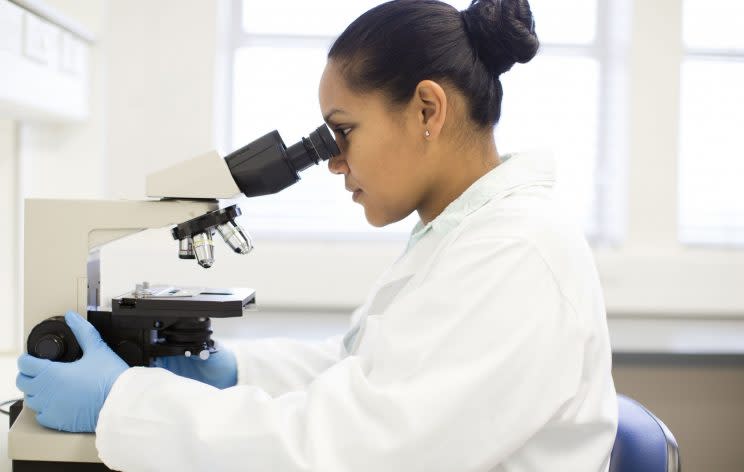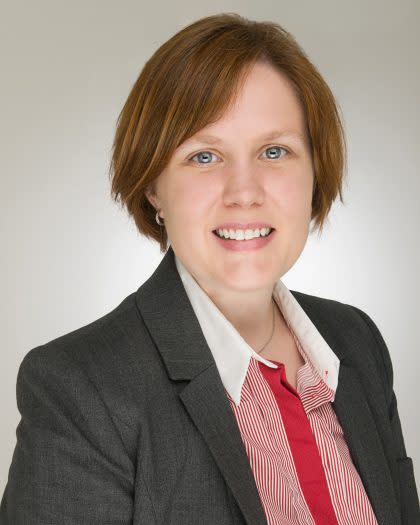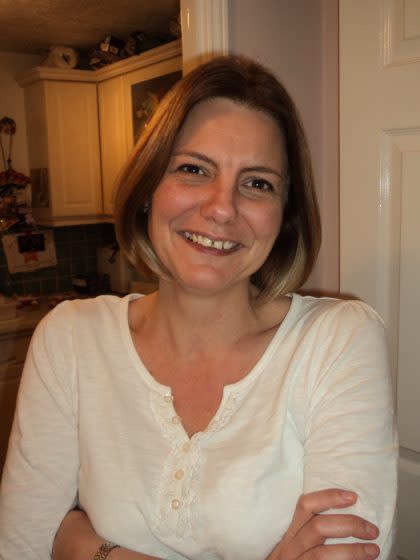International Women’s Day 2017: Women leading the way in science and technology

Celebrated on 8 March every year, International Women’s Day (IWD) was first marked by the United Nations in 1975 and celebrates women’s achievements.
The day marks a call for action for boosting gender parity and includes a range activities such as political rallies, and conferences. This year’s theme is aimed at working towards a more gender inclusive working world.
Yahoo News UK asked five women leading the charge in the historically male-dominated science and tech world about how they worked their way into their current roles and what challenges they faced along the way. Here’s what they told us…
Kim Nilsson
CEO
Pivigo

What does your current job involve?
“I’m the CEO and one of two founders of Pivigo, a data science marketplace and training provider. We connect freelancing data scientists with organisations and businesses looking to become more data driven on our online platform. As CEO of a start-up I tend to get involved in everything that goes on in the business.”
What route did you take to your current role?
“Oh, a very long one. I decided when I was 13 years old that I wanted to become an astronomer, and from there it was a straight path to my PhD in Astrophysics. I continued with two more science positions before I finally came to terms with the fact that I wasn’t enjoying it as much as I thought I would.
“I ended up doing an MBA at Cranfield School of Management in the UK, just to learn about business and figure out what my place in industry was going to be. I would never have thought it would be as an entrepreneur, although perhaps I should have known given that I am in fact a fourth-generation female entrepreneur in my family.”
What is the biggest challenge you’ve faced?
“Starting a tech business as a female PhD graduate was not easy. There is a lot of prejudice towards women still, unfortunately, and on top of that also towards academics. It has taken me several years of hard work to earn a certain level of respect in the industry, and to prove that I can do business as well as anyone in this industry.
“Fortunately, outright examples of discrimination are still rare, but they do happen. Most recently I tried to network with a VC at an event who clearly only had interest in the male CEO of another start-up that was standing next to me. Still, I do find that these individuals come around quickly once they do listen to me and understand that I have something of relevance to say, and that I can say it with authority.”
What advice would you give to anyone wanting to get into a similar role?
“Just do it! If you are new to starting a business, make sure you have access to advice. If you don’t have a co-founder, this could be via an accelerator programme, via your University, or via your wider network. Also set yourself a goal and a decision point. For example, decide how many clients you want to have, or how far you want to get with your product launch, by a certain date and agree with yourself to evaluate at that point whether it is worth continuing or not. That way you are taking a calculated risk, and whether it works or not you will have gathered incredibly valuable experience.”
Professor Claire J. Carmalt
Head of Chemistry Department and Professor of inorganic chemistry
University College London

What does your current role involve?
“I’m responsible for the organisation and general conduct of the department, as well as participating in its teaching and research. I’m the first female head of department since it was established in 1828! I have an active research group developing innovative new routes to technologically important inorganic materials.”
What route did you take to your current job?
“I have worked at UCL since 1997 and before that, I was a postdoctoral research fellow at the Science and Technology Center, University of Texas at Austin, USA and I did both my BSc and PhD at University of Newcastle upon Tyne, UK.”
What is the biggest challenge you’ve faced?
“While teaching and management roles can be challenging the biggest challenge is raising research funding, getting grants funded and finding appropriate partners who are willing to invest in your ideas.”
What advice would you give to anyone wanting to get into a similar role?
“It can be tough sometimes but it is a hugely rewarding role particularly the interaction with students, seeing their delight when they get great results in their research project and their enthusiasm for learning and understanding topics at the undergraduate level. Make the most of collaborations and ensure that you manage your time effectively so that you can achieve a good work-life balance.”
Anne-Marie Imafidon MBE
CEO
Stemettes

What does your current role involve?
“I’m currently CEO at award-winning social enterprise Stemettes: working to inspire and support girls & young women into technical roles.
“My role includes managing an excellent team to run events, workshops and programmes centred on our ‘free, fun, food’ ethos around the country; doing interviews & speaking at events; and sitting on calls with our industry partners or travelling to meetings.”
What route did you take to your current job?
“I used to work in technology at an investment bank in something called Enterprise Collaboration and saw an industry problem. After doing some research and blogging for a while, I has an idea that I acted on, and ended up starting Stemettes. three years in, I went full-time on the project.”
What is the biggest challenge you’ve faced working in your industry?
“My biggest challenge has been learning to work well with people, rather than the technology itself! Technology is fantastic but it only does as well as the people using it; I find people a lot more complicated than technology. Everyone has different motivations and personal challenges, so you have to learn to listen and work in mutually beneficial ways.”
What advice would you give to anyone wanting to get into a similar role?
“I’d say to become a social enterprise CEO or work in technology takes lots of research and a willingness to always be learning. I also live by the mantra ‘Seek forgiveness, Not permission’ – don’t ask too many people for permission to do new things. It’s very easy to be told ‘No’, but there’s no reason why you can’t be the first to do something.”
Libby Jackson
Human Spaceflight and Microgravity Programme Manager
UK Space Agency

What does your current role involve?
“I manage the UK’s activities in human spaceflight and the science that is undertaken on the International Space Station (ISS) and other space analogue facilities such as parabolic flights, drop towers and bed rest studies”.
What route did you take to your current job?
“I’ve always been fascinated by space, and human spaceflight in particular, ever since I was a young child, but through my teenage years and even my degree I didn’t think that I would work in this area as at the time the UK did not contribute to human spaceflight programmes.
“I studied Physics at university, and then did a Masters degree in Astronautics and Space Engineering. I started out working in satellite operations in the UK for Airbus, and then moved to Munich, where I worked in the European Space Agency’s Mission Control for the International Space Station (ISS).
“I worked there for seven years, as an instructor, flight controller and flight director. I left there in 2014 to work at the UK Space Agency, managing the education programme for Tim Peake’s mission and recently moved into my current role.
What is the biggest challenge you’ve faced?
“The locations. I’ve followed jobs that I want to do, and as the industry is relatively small and specialised I haven’t had the luxury of choosing where to work. Every new job so far has resulted in a move to a brand new place on my own, starting over with making new local friends, getting to know the areas and even learning a new language.
“Every move has been a challenge, but one that I’ve embraced and the rewards for doing so have been the most amazing opportunities in my job and the chance to explore new areas.”
What advice would you give to anyone wanting to get into a similar role?
“Never lose sight of your dreams and ambitions, no matter how impossible they seem. With hard work and determination, anything is possible and you can find yourself achieving those dreams. Find your passion and go for it.
“The space sector is very broad and multi-disciplinary, so there really is a route into if for everyone. Make contacts (UKSEDS are great for young people interested in the space sector), network and keep your ear to the ground – then grab any opportunities that come your way and make the most of them”.
Jyoti Shah
Consultant Urological Surgeon

What does your current role involve?
“I am a full-time Consultant Urological Surgeon, working in the West Midlands, with a special interest in prostate cancer. Although this is my paid job, I have many other roles (unpaid and done in my own time) including: an External Examiner for final MBBS examination, Editor-in-Chief of Medical Woman and reviewer for numerous international medical journals. I have published four books, nine book chapters and have over 60 peer-reviewed publications in medical journals”.
What route did you take to your current job?
“After completing my medical degree, I took some time out of clinical training to undertake research culminating in an MS and an MD. I then resumed my clinical training and took up this consultant post in 2008 after I passed my FRCS Urology exit examination.
“I have eight degrees and believe that, in order to be respected in my profession, I need to better than the men, both clinically and academically”.
What is the biggest challenge you’ve faced working in your industry?
“Firstly, the constant changing face of the NHS and the continued demoralisation of the medical workforce resulting in early retirements or doctors leaving this country; and secondly, being a female surgeon working in a male-dominated environment. In my own hospital with over 30 consultant surgeons, I am the only female surgeon”.
What advice would you give to anyone wanting to get into a similar role?
“Follow your passion; work hard and do not worry about what others say. You have to believe in yourself.”

 Yahoo News
Yahoo News 


